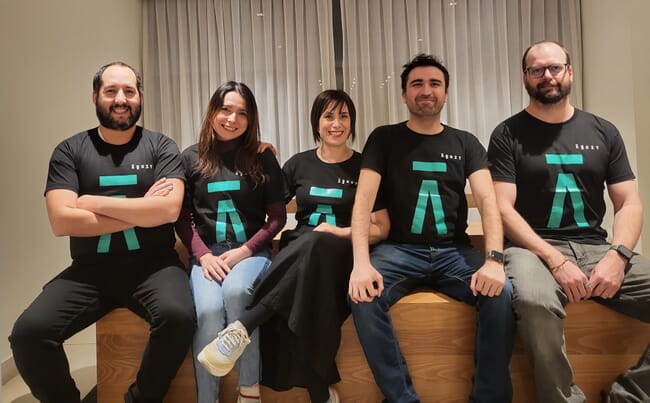
From left to right: Cristián Valenzuela, Dina Beltrán, Daniela Allerbon, Patricio Flores and Jörn Bethke © Aquit
Prior to Allerbon joining Aquit, biotechnologists Jörn Bethke and Cristián Valenzuela had spent 15 years working together in the lab, culminating in the duo focusing on developing a sustainable alternative to antibiotic use in the aquaculture industry.
“They are experts in fish immunity,” explains Allerbon. “They knew that there was a way to trigger immunity using something from the fish that imitates nature. So they came up with this idea of taking a key protein from the fish that boosts its natural immunity, reproducing it outside of the fish [using gene-engineered microbes that are grown in bioreactors], and then giving it to the fish as a preventive treatment.”
In 2017, the duo were awarded a grant from Microsoft Imagine Labs that allowed them to undertake their first trials. Partnering with a multinational lab, they validated the product – an additive that was applied to the oil coating of feed pellets – via in vivo testing on salmon, involving the main pathogens in the Chilean salmon industry.
This early success encouraged Bethke and Valenzuela to participate in the 2021 Global Aquaculture Challenge accelerator programme, run by the Yield Lab Asia Pacific, where they won the sustainability prize. Almost immediately they were scouted by Buenos Aires-based GridX, a company builder and funding incubator specialising in biotech.
“At that time I was seeking a change in direction and looking for a new challenge. So, I applied and was selected by this incubator as an entrepreneur,” explains Allerbon. “[GridX] is an incubator that works like Tinder for scientific projects and entrepreneurs.”
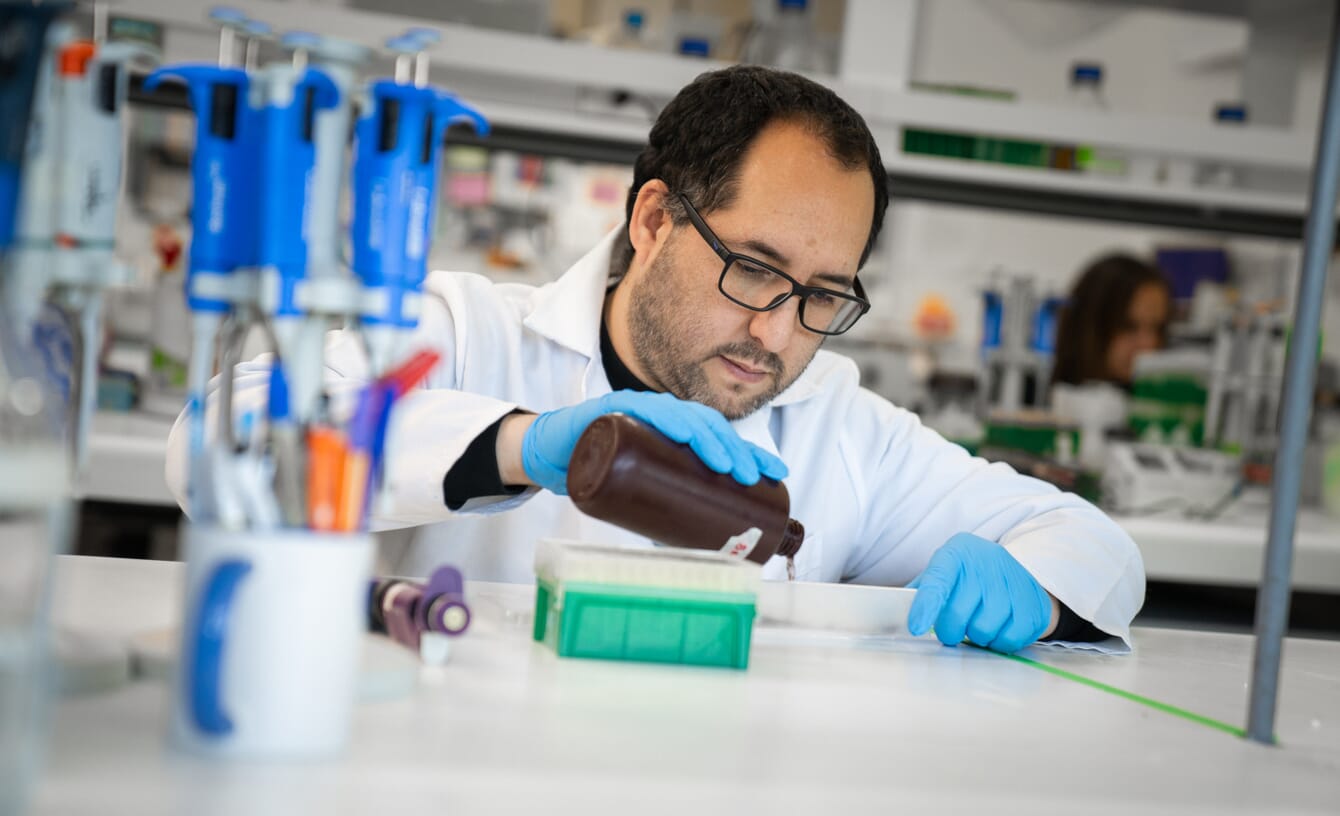
Prior to co-founding Aquit, Valenzuela spent 15 years working with Bethke in the lab, culminating in the duo focusing on developing a sustainable alternative to antibiotic use in the aquaculture industry © Aquit
With Allerbon based in Argentina and Bethke and Valenzuela in Chile, it was almost a year until the trio met in person – largely due to Covid travel restrictions throughout 2022, when the year-long GridX programme took place.
“After we matched at this accelerator, we started working together, became partners and incorporated the company in the States without knowing each other in person, and that was the start of our journey,” exclaims Allerbon.
Immune booster
According to Allerbon, Aquit’s feed additive modulates the immune system in salmon – the first species the startup has targeted – once digested. And because the protein is naturally occurring in salmon, its introduction into a fish doesn’t trigger an inflammatory response, which is often the case with immune boosters.
“One of its main features is it boosts the immune system of the salmon and it also improves the general health of the fish,” Allerbon explains. “We improve survival rates because we prevent the fish from getting infections and diseases. Also, we are improving the general health – fish grow faster, grow better and grow bigger – and we are improving yields as well.”
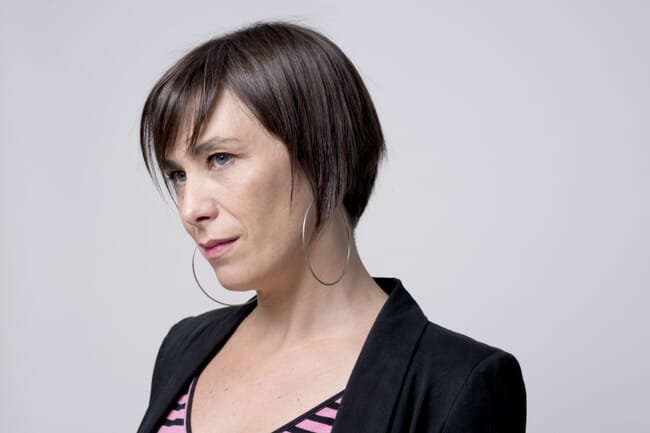
Despite incorporating the company in the States, it was almost a year until the trio met in person – due to Covid travel restrictions preventing Argentina-based Allerbon travelling to Chile, where Bethke and Valenzuela are based © Eugenia Kais / Aquit
In the case of salmon, Allerbon explains that the best application of the product is incorporating it into feed at the feed mills. “Salmon producers prefer to have ready-made feed. They prefer to feed fish directly without doing an additional process. So in the case of our salmon product we are going to work with the feed mills to mix up our product within the feed.”
Allerbon explains that if the protein within the feed is not eaten, it biodegrades – an important outcome for a company keen to produce an environmentally friendly product to promote sustainable aquaculture.
Product testing
Initial trials in fish tanks with salmon have proved very successful, revealing impressive survival rates against diseases responsible for a large percentage of infections in the Chilean salmon industry.
“What we have found is that by only using our product we have an 85 percent survival rates against Tenacibaculum, which is an emerging threat [in Chile]. This means that if you add that to the other preventative practices that we have, we could have amazing survival rates,” reveals Allerbon. “And then we had a 50 percent survival rate against SRS [salmonid rickettsial septicaemia], which is the toughest intracellular bacteria that they have in Chile.”
At the moment the focus for Aquit is to finalise the development of the product and to run pilot programmes with their existing Chilean partners, along with starting to work with salmon producers in Norway, Canada and Scotland.
“We are currently in talks and drafting the protocol to do a trial at sea. That will be the next step,” reveals Allerbon. “And after that the ambition and plan is to scale up production and start selling.”
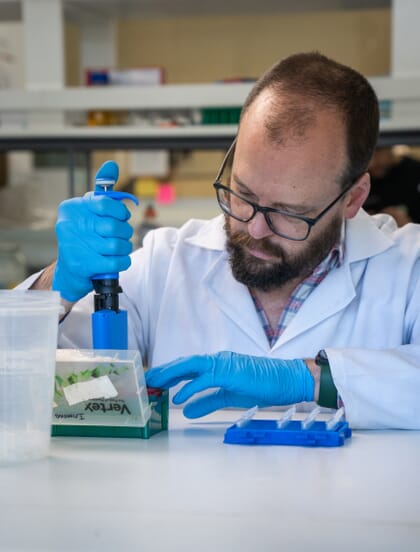
Trials have shown that Aquit's feed additive, which modulates the immune system in salmon once digested, improves survival rates due to preventing fish from getting infections and diseases, while also improving their general health © Aquit
AI technology
Although Aquit’s initial product development and trials have focused on salmon, the company is also looking to expand its product range into other species, such as tilapia and shrimp, using bioinformatics and AI technology.
“We are going to replicate our technology using an AI platform – we are training our algorithm to recognise the proteins in salmon that have very important needs, not only to do with immunity, but also growth, [feed] conversion rates, and things to do with health,” explains Allerbon. “It will then be able to identify proteins in other fish and produce them in the same way that we are producing our first product.”
The startup is working on the AI platform alongside devoting its time to R&D, while also expanding their team, thanks to recent funding.
“With the pre-Seed investment that we obtained in 2022 [from GridX] and a sizeable grant from [CORFO] the Chilean government [economic development agency], we were able to onboard our tech resource who is developing the AI platform and a molecular biologist, so we are now a team of five,” says Allerbon.
Winning year
2023 proved to be a particularly good year for Aquit. Not only did the startup win the 2023 Responsible Seafood Innovation Award in the aquaculture category, but it also won the demo day at The Ganesha Lab BIGinBIO Program – a specialist accelerator programme for biotech companies.
Reflecting on Aquit's victory at the Responsible Seafood Innovation Awards, Allerbon can see why they stood out from the other finalists.
“I think what we had different was we brought a solution to a problem that's really important, that not only affects producers – because they really want to do things well and properly, but sometimes they don't have the tools to do it – but also it's a problem for humanity, for the environment, for [human] health,” she reflects. “I think we have this double impact with a really innovative solution, and we were able to show that to the judges.”
2024 has also started well for Allerbon, as she was selected as one of 12 female-led ocean-focused startups from across Latin America to take part in the Women in Ocean Foods Innovation Studio in La Paz last month, run by Hatch Blue and Conservation International Ventures.
Born to be global
Allerbon is clearly very proud that Aquit is Latin American but she also sees the startup as a global company with a global reach working in a global industry.
“What we are taught on these accelerator programmes, as part of the startup framework, is that we are born to be global. It’s be global or die,” she explains. “We now have an intern who's Australian and lives in Norway. We have advisors from Norway, from England and from Asia-Pacific, so we intend to be a global company.”
However, Aquit certainly takes advantage of the fact it is based in Chile, which is the second largest salmon producer in the world, therefore allows the team to learn, understand and follow industry developments.
She adds: “It’s also less expensive to do research in Argentina and Chile than in other places, so we can be very efficient with the funds and achieve very good things in less time and with fewer funds. So we are using that to our advantage.”
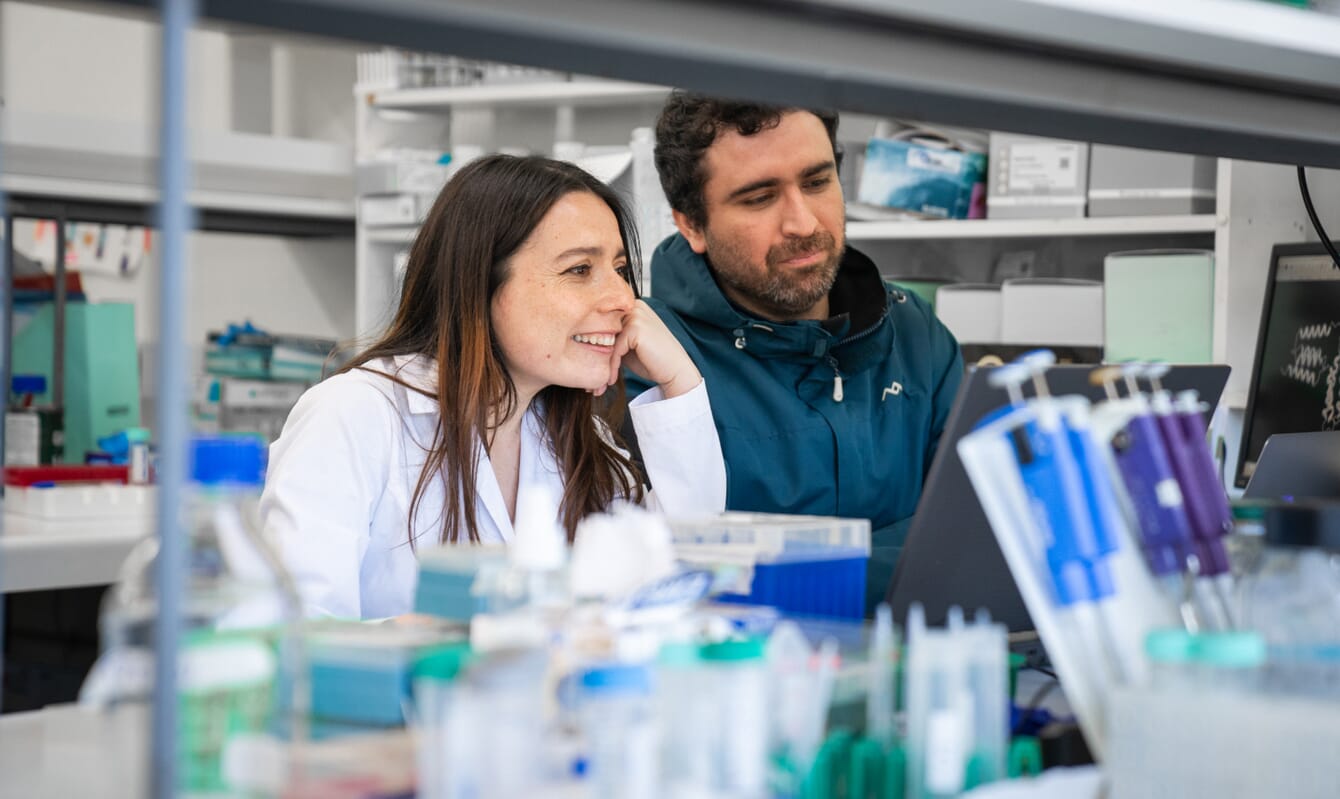
Recent funding has allowed the startup to onboard Flores, a tech resource who is developing the AI platform, and molecular biologist Beltrán, expanding the Aquit team to five © Aquit
Future plans
Looking ahead, Allerbon confirms that the company plans to develop products for other aquaculture species with the help of their in-development AI platform.
“After we have these products up and running we will move outside of aquaculture – we’ve already been offered to develop the same technology for other animal species,” she reveals.
With the two-year grant funding from the Chilean government covering costs for the first half of 2024, Allerbon is now actively looking for further investment, with some potentially exciting leads on the horizon.
“We are looking for a Seed round [so we can undertake] trials with partners and scale up production. We are currently in due diligence with several funds, so we hope to close a Seed round in 2024” she concludes.




